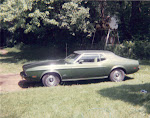The Declaration of Independence states that we have the right to pursue happiness. An article about how communities make us happy discusses different ways of measuring how our communities make us happy: through architectural beauty, environmental sustainability, education, good government, healthy food, transportation, etc.
On this 4th of July it is interesting to reflect on whether or not our local community has facilitated our pursuit (and capture?) of happiness. Is Normal a happy community?
Happy 4th of July! :)
Thursday, June 30, 2011
Friday, June 24, 2011
Normal Very, Very High Speed Rail? Probably not.
Japan is building the ultimate high speed rail system. The train uses magnetic force and actually floats above the track when running, practically eliminating the kind of wear-and-tear of traditional trains that scrape along metal tracks. So the trains last longer. The speed? Over 300 mph. Think about that.
The cost? Billions of dollars. (A 320-mile route would cost Japan around $112 billion.) The time to build the infrastructure? Years. (The 225-mile route that Japan is building is going to take 16 years.)
Do we have the money or the patience for this? No.
Like lots of innovations, though, perhaps the cost and building time will go down eventually. For now, it's fun to think about how quickly we could travel going that fast!
The cost? Billions of dollars. (A 320-mile route would cost Japan around $112 billion.) The time to build the infrastructure? Years. (The 225-mile route that Japan is building is going to take 16 years.)
Do we have the money or the patience for this? No.
Like lots of innovations, though, perhaps the cost and building time will go down eventually. For now, it's fun to think about how quickly we could travel going that fast!
Thursday, June 16, 2011
ISSCS: Can Someone Save this Building?
One of the main buildings on the old Illinois Soldiers' and Sailors' Children's Home property is in bad shape. Other parts of the property have been repurposed but the once impressive main building (that is very visible because it's on a fairly busy street) sits vacant. There is a similar site in Milwaukee that has its own foundation which is raising funds to restore the chapel on the property. There is the ISSCS Historical Preservation Society, which raised money for a statue on the property, but since this particular building is privately owned, that society would not be able to take action.
The local building is privately owned but most likely a victim to the recession. Every time I see that building, I try to think of possible uses: an art gallery, a museum, condos, a central location for a rapidly growing local organization that currently has no site, a unique-use building for one of the local institutions of higher learning. . .
The list of expenses involved in preparing this building for use is probably long and intimidating. But the longer it sits unused, the longer that list will become until everyone will agree that 'it's just not cost-effective to do work on it' and 'it's such a shame that nothing was done sooner'.
It's "sooner" right now.
The local building is privately owned but most likely a victim to the recession. Every time I see that building, I try to think of possible uses: an art gallery, a museum, condos, a central location for a rapidly growing local organization that currently has no site, a unique-use building for one of the local institutions of higher learning. . .
The list of expenses involved in preparing this building for use is probably long and intimidating. But the longer it sits unused, the longer that list will become until everyone will agree that 'it's just not cost-effective to do work on it' and 'it's such a shame that nothing was done sooner'.
It's "sooner" right now.
Monday, June 13, 2011
Normal Wireless Access Impact on Social Interaction
This is an article discussing the impact that wireless internet access has on people in public spaces, especially in parks. Uptown Normal has wireless access. Has it reduced social interactions? Are more people focused on their electronic gadgets instead of talking to others? People who work in the Uptown businesses would probably be the ones to notice any change from how it used to be. Maybe students and others always brought projects to work on while eating lunch or having coffee, which would mean that wireless access really hasn't had much of an impact on social interaction. On the other hand, perhaps people are less likely to start a conversation with someone who is working on a digital device instead of reading or doing paperwork.
Tuesday, June 7, 2011
Normal Ski Slopes?
Here's a great idea: Copenhagen is building a new waste-to-energy plant that will have ski slopes on it. People will take an elevator to the top of the building and ski down one of three slopes. As the article says, they have the snow but not the hills.
I wonder if that would work in Normal. If there were a tall building that also had a large enough circumference, it might. We don't have snow all winter but we have a few good snowstorms that would do the job. The Copenhagen project is actually going to "mist rainwater" on the slopes to coat them, so that's their solution to keeping an even amount of snow on the slopes, I guess.
Ski Normal!
I wonder if that would work in Normal. If there were a tall building that also had a large enough circumference, it might. We don't have snow all winter but we have a few good snowstorms that would do the job. The Copenhagen project is actually going to "mist rainwater" on the slopes to coat them, so that's their solution to keeping an even amount of snow on the slopes, I guess.
Ski Normal!
Subscribe to:
Comments (Atom)







